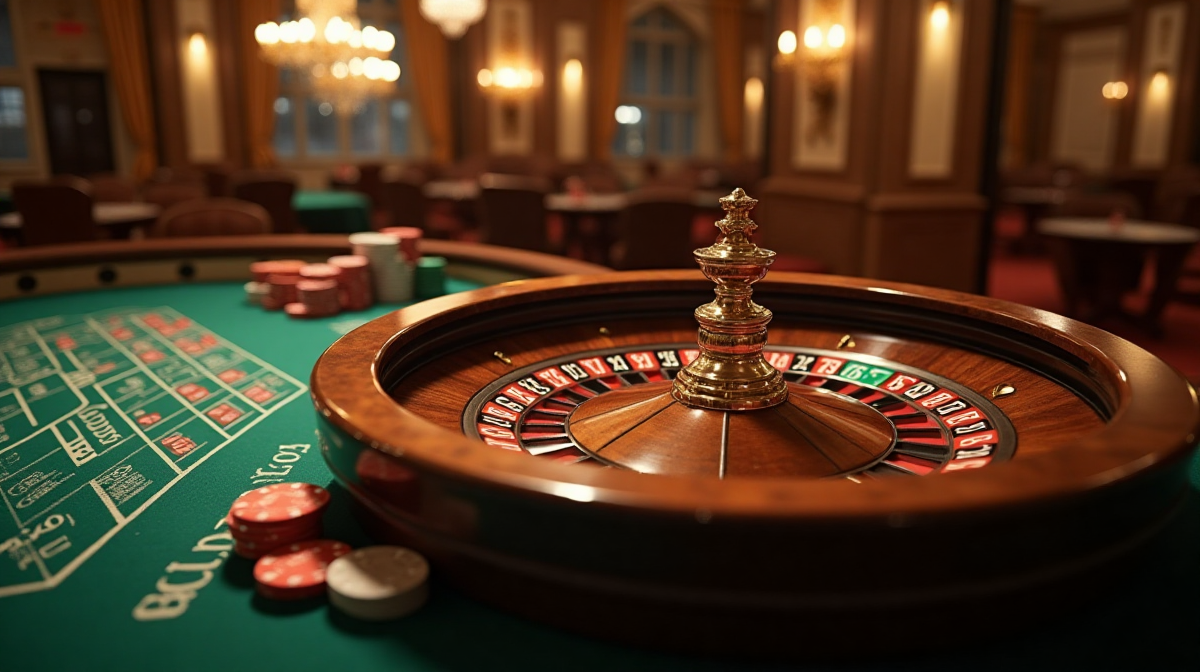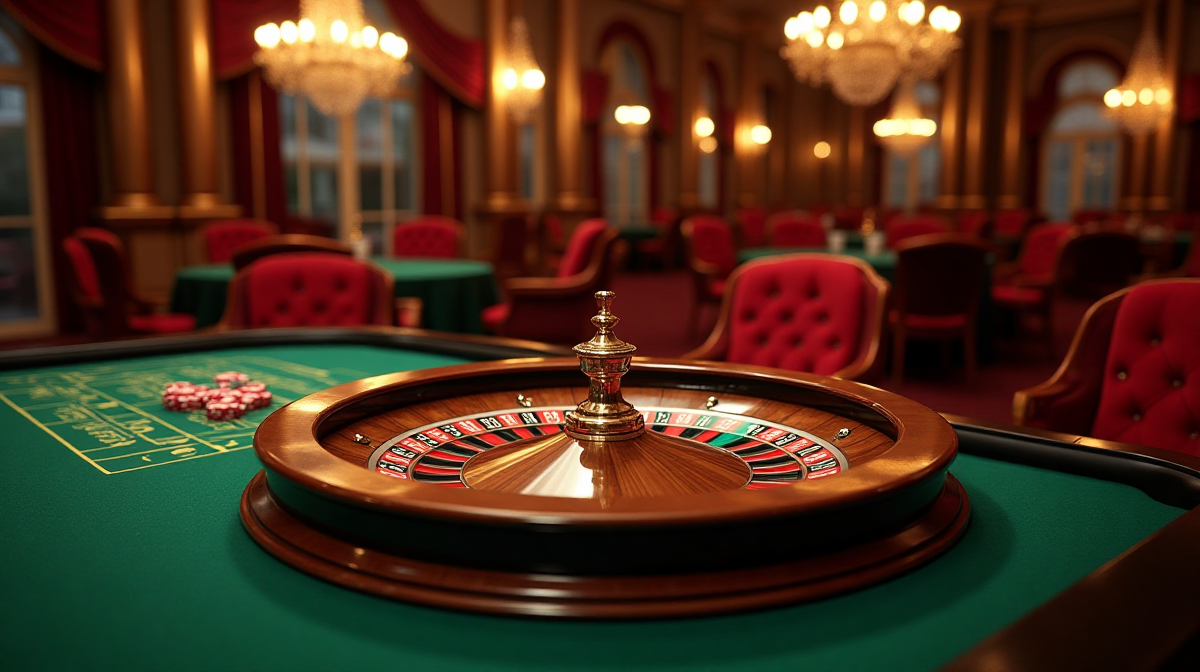Roulette Game Strategy: From Beginner to Pro
Introduction to Roulette
Roulette, a game of chance steeped in history and glamour, continues to captivate players worldwide. Whether you dream of an IPL Win or simply enjoy the thrill of the spin, understanding the fundamentals is crucial. This guide will take you from a novice to a more informed player, exploring various strategies and debunking common myths.
Understanding the Roulette Wheel & Table Layout
The roulette wheel consists of 37 (European) or 38 (American) numbered pockets, alternating between red and black. The ‘0’ (and ‘00’ in American roulette) represent the house advantage. The table layout mirrors the wheel, offering a variety of betting options. Knowing where to place your chips is the first step to enjoying the game.
Different Types of Roulette - Pros & Cons
European roulette boasts a single zero, offering a lower house edge (2.7%) compared to American roulette (5.26%) with its double zero. French roulette is similar to European, but with “La Partage” and “En Prison” rules that further reduce the house edge under certain conditions. Choosing the right variant significantly impacts your odds. Many players seeking high stakes thrills also explore online platforms, sometimes searching for a reliable iplwin login to access various gaming options.
Basic Roulette Terminology
Inside bets involve wagering on specific numbers or small groups of numbers, offering higher payouts but lower probabilities. Outside bets, like red/black or odd/even, have lower payouts but higher winning chances. Understanding these distinctions is fundamental to formulating a strategy. Don’t forget, the allure of potential winnings sometimes leads people to explore different avenues, even considering the possibility of matching their roulette success with the excitement surrounding the ipl.
House Edge Explained – Why Roulette Isn’t Truly Random
The house edge represents the casino’s average profit over time. While roulette appears random, the ‘0’ (and ‘00’) gives the casino a statistical advantage. This doesn’t mean you can’t win, but it highlights the importance of responsible gambling and understanding the long-term odds.
Beginner Roulette Strategies: Building a Foundation
These strategies are designed for newcomers, focusing on simplicity and risk management.
The Martingale System – A Risky Approach
The Martingale system involves doubling your bet after each loss, aiming to recover previous losses with a single win. While seemingly effective, it requires a large bankroll and can lead to substantial losses if you encounter a prolonged losing streak.
The Reverse Martingale System – A More Conservative Option
The Paroli system involves doubling your bet after each win, capitalizing on winning streaks. It’s less risky than the Martingale but still relies on consistent wins.
D’Alembert System – A Gradual Betting Strategy
The D’Alembert system involves increasing your bet by one unit after a loss and decreasing it by one unit after a win. It's a more conservative progression than the Martingale.
Flat Betting – A Simple and Safe Starting Point
Flat betting involves wagering the same amount on each spin, regardless of whether you win or lose. It offers a low-risk approach but also limited potential for significant gains.
Bankroll Management for Beginners – Protecting Your Funds
Before playing, set a budget and stick to it. Divide your bankroll into smaller units and avoid chasing losses. Responsible gaming is key, and sometimes a break is as rewarding as a win – perhaps enjoying a glass of roulette whisky while contemplating your next move.

Intermediate Roulette Strategies: Increasing Your Edge
These strategies require a deeper understanding of the game and involve more complex approaches.
The Fibonacci System – Leveraging the Fibonacci Sequence
The Fibonacci system utilizes the Fibonacci sequence (1, 1, 2, 3, 5, 8, 13…) to determine bet sizes. It’s less aggressive than the Martingale but still requires careful bankroll management.
The Labouchere System - Complex Progression
The Labouchere system involves creating a sequence of numbers and wagering based on the sum of the first and last numbers in the sequence. It's a complex system requiring meticulous record-keeping.
Hot and Cold Numbers – Identifying Trends
Tracking which numbers have appeared frequently (hot) or infrequently (cold) is a common practice. However, roulette is inherently random, and past results don’t guarantee future outcomes.
Visual Ballistics – An Attempt to Predict the Winning Section
Visual ballistics involves attempting to predict the winning section based on the speed of the ball and wheel. While some claim success, it's extremely difficult and often unreliable.
Combining Strategies – Adapting to Different Situations
Experimenting with different strategies and adapting them to your playing style can be beneficial.

Advanced Roulette Strategies: For the Serious Player
These strategies are for experienced players with a strong understanding of statistics and risk management.
Biased Wheel Detection – Is It Still Possible?
Identifying a biased wheel – one with imperfections that favor certain numbers – was once a viable strategy. However, modern casino equipment is rigorously tested, making biased wheels rare.
Using Statistical Analysis – Tracking Results & Identifying Patterns
Tracking your results and analyzing patterns can provide insights into your performance and inform your betting decisions.
Advanced Bankroll Management – Kelly Criterion & Optimal Faction Sizing
The Kelly Criterion is a mathematical formula used to determine the optimal percentage of your bankroll to wager on each bet.
Roulette Software and Tools – Legality & Effectiveness
Various roulette software programs claim to predict winning numbers. However, their legality is questionable, and their effectiveness is often dubious.
Exploiting Casino Bonuses & Promotions
Taking advantage of casino bonuses and promotions can increase your bankroll and provide more opportunities to play.
Understanding Roulette Myths and Misconceptions
The Gambler's Fallacy
The gambler’s fallacy is the belief that past events influence future outcomes in a random game. Each spin of the roulette wheel is independent, and previous results have no bearing on the next.
Hot/Cold Streaks – Randomness vs. Perception
The perception of hot and cold streaks is often a result of pattern recognition in random data. It's important to remember that even with a string of losses, the odds remain the same.
The Myth of Winning Systems – No Guaranteed Success
There is no guaranteed winning system for roulette. The house edge ensures that the casino has a statistical advantage over the long term.
Casino's Role in Maintaining Randomness
Casinos employ strict measures to ensure the randomness of the roulette wheel and prevent manipulation.
Roulette Etiquette and Responsible Gambling
Casino Etiquette - What to Know Before You Play
Familiarize yourself with casino etiquette, such as knowing when to place your bets and respecting other players.
Recognizing Problem Gambling – Signs & Resources
Be aware of the signs of problem gambling, such as chasing losses or gambling with money you can’t afford to lose. Resources are available to help those struggling with gambling addiction.
Setting Limits – Time and Money Limits
Set both time and money limits before you start playing. Stick to your limits and avoid exceeding them.
Responsible Gameplay – Treating Roulette as Entertainment
Remember that roulette should be treated as a form of entertainment, not a way to make money. The excitement of potentially winning, like celebrating an IPL Win, should be secondary to enjoying the game responsibly.
Conclusion: The Path to Becoming a Roulette Pro
Realistic Expectations – Understanding the Long-Term Odds
Accept that roulette is a game of chance with a house edge. Don’t expect to win consistently.
Continuous Learning and Adaptation
Continuously learn about the game and adapt your strategies based on your experiences.
The Importance of Discipline and Emotional Control
Discipline and emotional control are crucial for successful roulette playing. Avoid making impulsive decisions based on emotions.
Resources for Further Learning
Numerous books and websites offer valuable information about roulette strategy and bankroll management.


